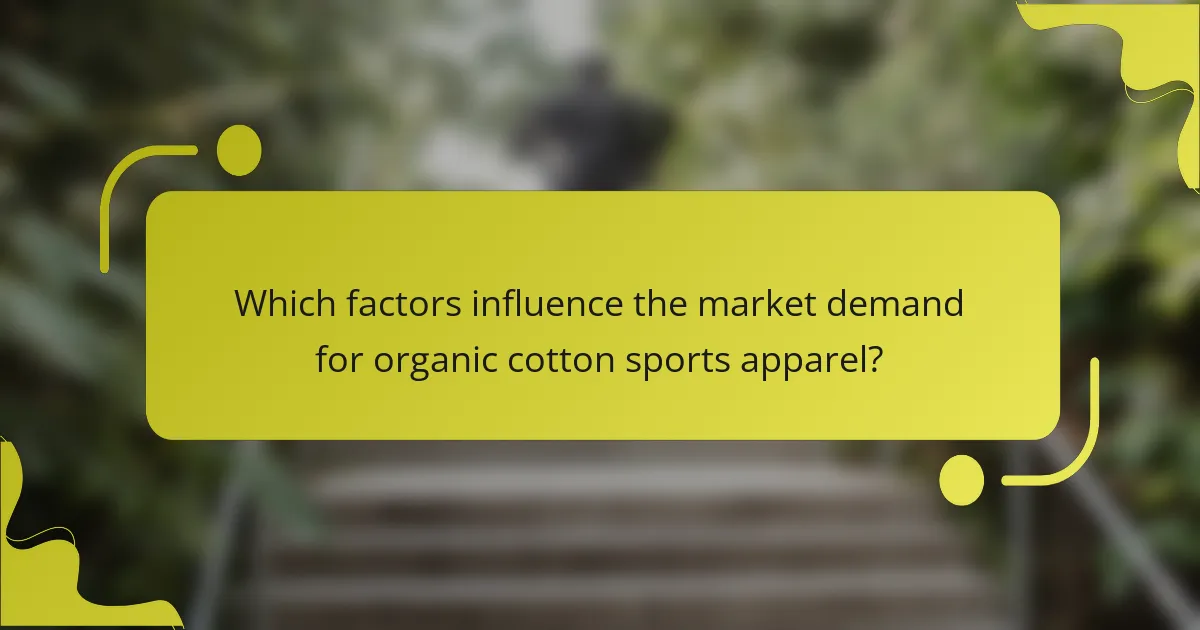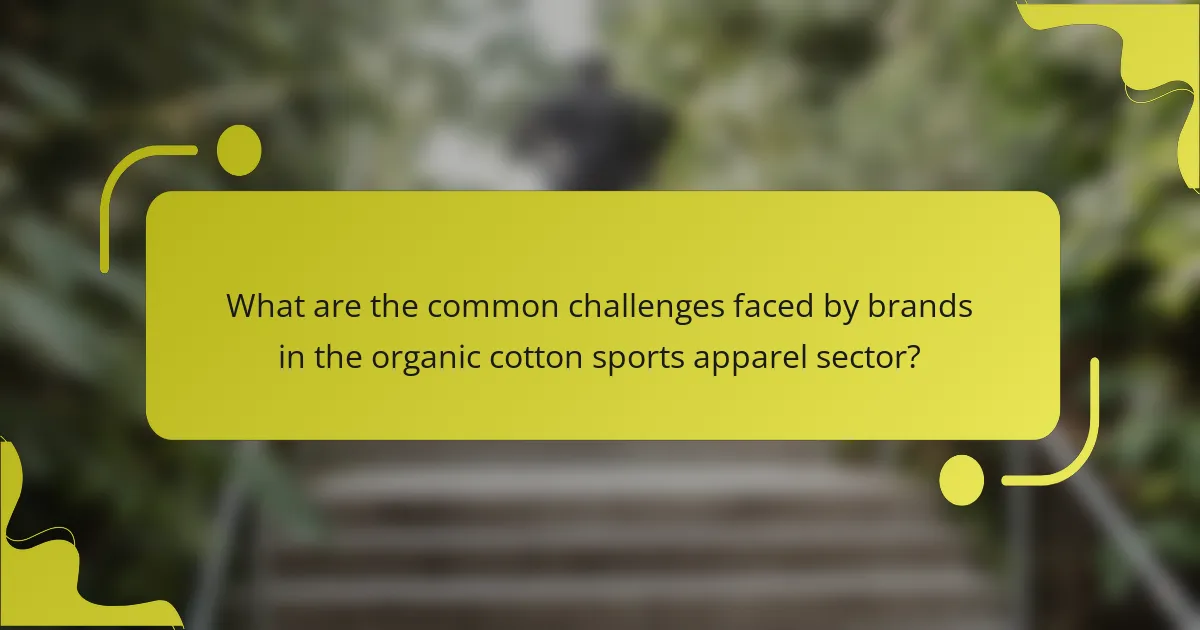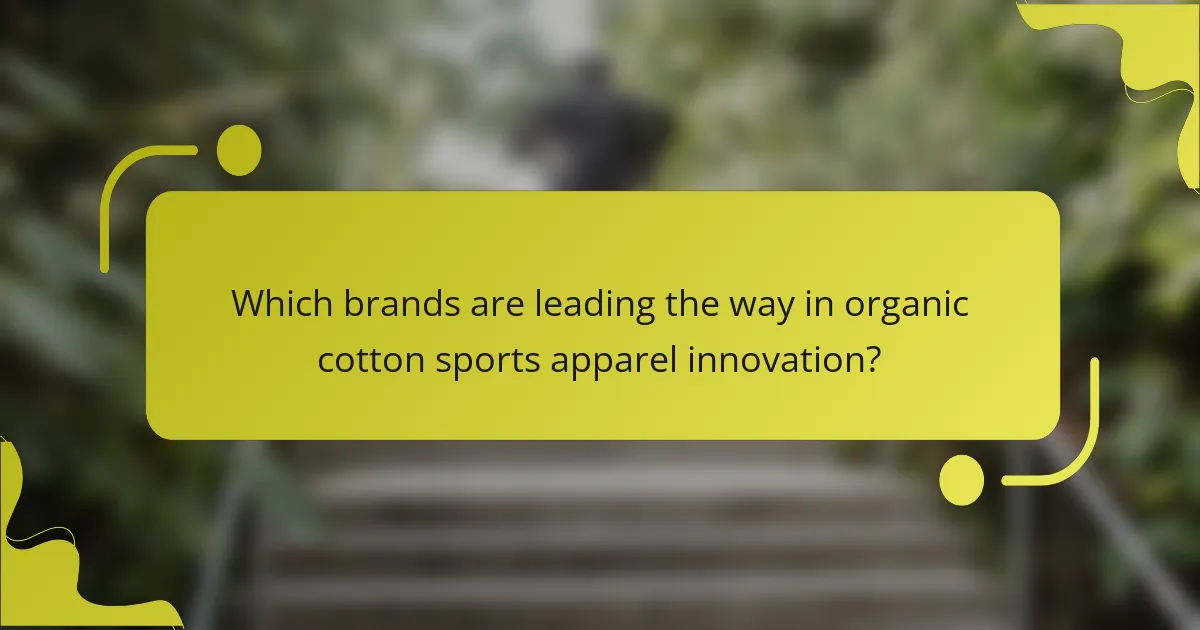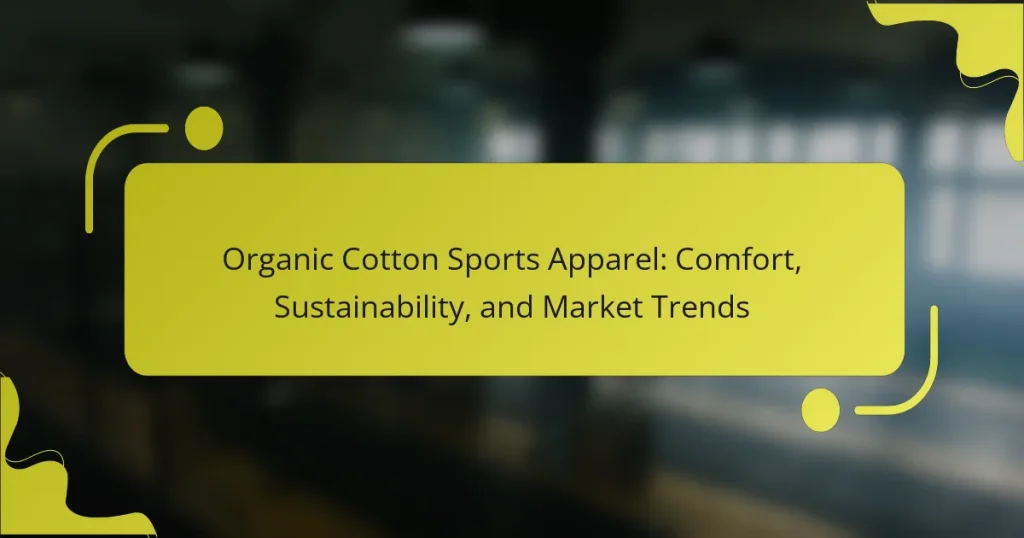Organic cotton sports apparel provides comfort and sustainability, appealing to eco-conscious consumers. This article explores the health benefits, market trends, and leading brands in the sector. It also addresses challenges like supply chain issues and consumer awareness. Finally, we highlight emerging trends and tips for making responsible purchases.

What are the key benefits of organic cotton sports apparel?
Organic cotton sports apparel offers numerous benefits, including comfort, sustainability, and health advantages. The fabric is breathable and soft, enhancing wearability during physical activities. Additionally, organic cotton is grown without harmful pesticides, promoting environmental health. This sustainable choice appeals to eco-conscious consumers, aligning with current market trends favouring ethical fashion. Moreover, organic cotton sports apparel can reduce skin irritation, making it ideal for sensitive skin.
How does organic cotton compare to conventional cotton in terms of comfort?
Organic cotton offers superior comfort compared to conventional cotton due to its natural fibres and lack of harmful chemicals. Organic cotton is softer, more breathable, and hypoallergenic, making it ideal for sensitive skin. Additionally, the absence of synthetic pesticides enhances its comfort level, as it allows for a more natural feel. Unlike conventional cotton, which may undergo harsh treatments, organic cotton maintains its integrity, providing a more pleasant wearing experience.
What sustainability advantages does organic cotton offer?
Organic cotton offers significant sustainability advantages, including reduced water usage, lower pesticide application, and improved soil health. Its cultivation enhances biodiversity and supports farmers through fair trade practices. Organic cotton apparel contributes to a circular economy by being biodegradable and often produced with eco-friendly processes. This aligns with growing consumer demand for sustainable fashion choices.

Which factors influence the market demand for organic cotton sports apparel?
The market demand for organic cotton sports apparel is influenced by consumer awareness, sustainability trends, and health benefits. Increased awareness of environmental issues drives consumers to prefer sustainable materials. Additionally, the health benefits of organic cotton, such as reduced skin irritation, attract health-conscious buyers. Market trends indicate a growing preference for eco-friendly products, further boosting demand. As a result, brands focusing on ethical production practices see enhanced consumer loyalty.
How do consumer preferences shape the organic cotton apparel market?
Consumer preferences significantly influence the organic cotton apparel market by prioritising comfort and sustainability. Shoppers increasingly seek products that align with eco-friendly values while providing functional benefits. The demand for organic cotton sports apparel reflects a shift towards sustainable fashion, with consumers valuing transparency in sourcing and production methods. Brands that emphasise these attributes often see increased loyalty and market share, demonstrating the powerful impact of consumer choices on industry trends. As awareness of environmental issues grows, the preference for organic materials will likely continue to shape market dynamics.
What role do eco-certifications play in purchasing decisions?
Eco-certifications significantly influence purchasing decisions by assuring consumers of sustainability and ethical practices. Shoppers increasingly prioritise eco-friendly products, such as organic cotton sports apparel, due to heightened environmental awareness. Certifications validate claims of organic farming and fair labour practices, enhancing brand trust. As a result, products with credible eco-certifications often experience higher sales and customer loyalty, reflecting a shift towards sustainable consumerism.

What are the common challenges faced by brands in the organic cotton sports apparel sector?
Brands in the organic cotton sports apparel sector face challenges such as supply chain issues, higher production costs, and consumer awareness. Limited availability of organic cotton affects consistency in product offerings. Additionally, competition from conventional apparel brands complicates market positioning. Educating consumers about the benefits of organic materials remains essential. Lastly, navigating certifications and sustainability claims can be complex, impacting brand credibility.
How do production costs impact pricing strategies?
Production costs significantly influence pricing strategies for organic cotton sports apparel. Higher production costs, driven by sustainable practices and raw material sourcing, often lead brands to adopt premium pricing strategies. This approach reflects the value of comfort, durability, and eco-friendliness associated with organic cotton. As a result, brands may target environmentally conscious consumers willing to pay more for sustainable options. Additionally, competitive pricing strategies may emerge as brands seek to balance cost and market demand, impacting overall market trends in the apparel industry.
What obstacles exist in sourcing high-quality organic cotton?
Sourcing high-quality organic cotton faces several obstacles. Key challenges include limited supply, higher production costs, and inconsistent quality standards. Organic cotton farming often relies on specific climatic conditions and sustainable practices, making it less accessible. Additionally, certification processes can be complex and time-consuming, impacting market availability.

Which brands are leading the way in organic cotton sports apparel innovation?
Leading brands in organic cotton sports apparel innovation include Patagonia, tentree, and prAna. These companies prioritise sustainability and comfort while incorporating advanced technology in their products. Patagonia emphasises eco-friendly practices and transparency in sourcing, while tentree plants ten trees for every item sold, enhancing their environmental impact. prAna focuses on fair trade and organic materials, appealing to conscious consumers. These brands are setting trends by combining performance with ethical production.
What unique features set these brands apart in the market?
Organic cotton sports apparel brands stand out through their commitment to sustainability, innovative designs, and ethical production practices. Unique features include eco-friendly materials, superior comfort, and stylish aesthetics. These brands often emphasise transparency in sourcing and manufacturing, appealing to environmentally conscious consumers. Additionally, some offer customisable options or specific performance enhancements, setting them apart in a competitive market.
How do regional preferences affect brand strategies?
Regional preferences significantly shape brand strategies for organic cotton sports apparel by influencing design, marketing, and distribution. Brands must adapt to local values, such as sustainability or comfort, to resonate with diverse consumer bases. For instance, regions prioritising eco-friendliness may prefer brands highlighting organic materials and ethical practices. Additionally, cultural trends dictate colour and style preferences, requiring brands to tailor their offerings accordingly. Understanding these factors enhances brand relevance and customer loyalty across different markets.

What trends are emerging in the organic cotton sports apparel industry for 2025?
Emerging trends in the organic cotton sports apparel industry for 2025 include increased consumer demand for sustainability, innovative fabric technologies, and enhanced performance features. Brands are focusing on eco-friendly production methods and transparency in their supply chains.
Sustainability is a primary driver, with consumers prioritising environmentally conscious brands. For instance, the market for organic cotton apparel is projected to grow by 11% annually through 2025.
Innovative fabric technologies are enhancing comfort and functionality, integrating moisture-wicking properties and breathability. Brands are also exploring biodegradable materials to reduce environmental impact.
Additionally, customisation and personalisation in sports apparel are gaining traction, allowing consumers to express their individuality while supporting sustainable practices.
How is technology influencing the design and production of organic cotton apparel?
Technology significantly enhances the design and production of organic cotton apparel through innovative processes and sustainable practices. Advanced textile manufacturing techniques, such as digital printing and 3D knitting, improve efficiency and reduce waste. Automation in production minimises labour costs and enhances precision, ensuring consistent quality. Sustainable technologies, like waterless dyeing and bio-based materials, decrease environmental impact. Moreover, data analytics and AI optimise supply chain management, enabling brands to respond quickly to market trends. These advancements not only promote sustainability but also enhance consumer comfort and satisfaction in organic cotton sports apparel.
What consumer behaviors are driving these trends?
Consumer behaviours driving trends in organic cotton sports apparel focus on comfort, sustainability, and ethical production. Shoppers increasingly prefer eco-friendly materials, valuing the environmental impact of their purchases. The rise of health consciousness also influences demand for comfortable, breathable fabrics. Additionally, social media and influencer marketing shape consumer perceptions, making organic cotton a desirable choice for style and sustainability.

How can consumers ensure they are making responsible choices when purchasing organic cotton sports apparel?
Consumers can ensure responsible choices when purchasing organic cotton sports apparel by researching brands, verifying certifications, and considering sustainability practices. Look for certifications like GOTS or OEKO-TEX, which indicate organic standards and safety. Assess the brand’s transparency regarding sourcing and production methods. Additionally, evaluate the durability and lifecycle of the apparel, as longer-lasting products reduce waste. Engaging with customer reviews and feedback can provide insights into quality and ethical practices. By prioritising these factors, consumers can align their purchases with their values.
What labeling should consumers look for to verify authenticity?
Consumers should look for certifications like GOTS (Global Organic Textile Standard) and OEKO-TEX to verify authenticity in organic cotton sports apparel. These labels ensure the product meets strict organic and environmental standards. Additionally, check for transparency in sourcing and production practices. Authentic brands often provide detailed information about their supply chain.
What are the best practices for caring for organic cotton sports apparel?
To care for organic cotton sports apparel, wash in cold water, avoid bleach, and air dry. This preserves the fabric’s integrity and sustainability. Regularly check for stains and treat them promptly to maintain appearance. Store in a cool, dry place to prevent mildew.
What common mistakes should consumers avoid when selecting organic cotton products?
Consumers should avoid purchasing organic cotton products based solely on price or misleading certifications. Look for verified organic labels and research brands for transparency. Check for sustainable practices and ethical sourcing to ensure quality. Additionally, consider the product’s comfort and fit, as these attributes significantly impact satisfaction.




